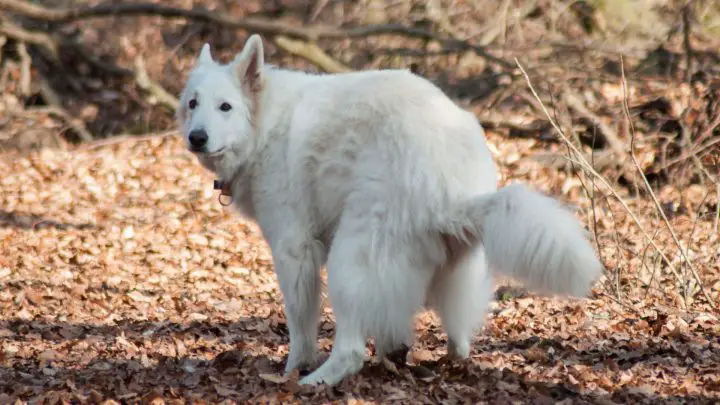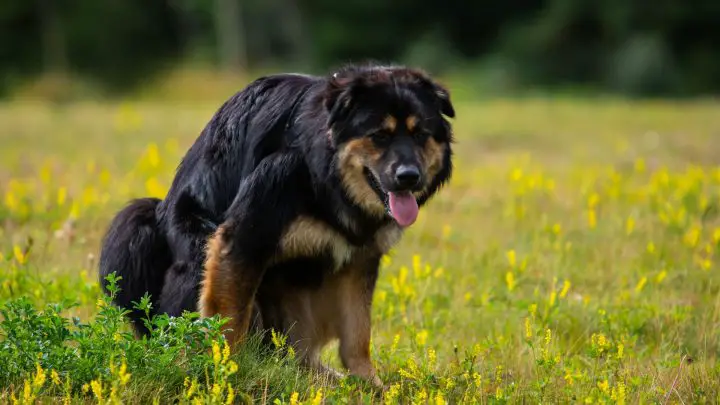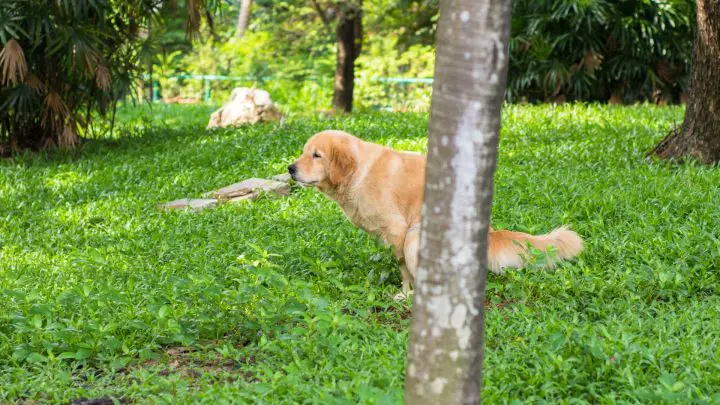Your dog’s poop probably isn’t your favorite thing to think about. But keeping an eye on your dog’s poop is a must if you care about his health and well-being. Usually, if your dog’s poop is any color other than the usual medium brown, it signals that something is amiss. Today, we’ll talk about orange dog poop and what it means for your dog’s health.

Table of Contents
- What’s the Normal Dog Poop Color?
- So What Does Orange Dog Poop Mean?
- The Main Causes of Orange Dog Poop
- What to Do if Your Dog’s Poop is Orange
- Looking Out for Your Furry Friend
- FAQ
What’s the Normal Dog Poop Color?
You’ve probably heard the usual advice to call your vet if your dog’s poop looks abnormal. But first, it’s important to know what normal dog poop looks like.
Healthy dog poop looks like a log — it’s brown and slightly squishy, and it should come out in one piece for the most part.
Often, one of the best indicators of a health issue in a dog is a strange dog poop color. Before we take a closer look at orange dog poop, here’s a brief rundown of abnormal dog poop colors and what they mean:
- Green poop — Green dog poop can mean a lot of things. Sometimes it just means your dog eats too much grass. Green dog poop can also be a sign of intestinal parasites or several forms of GI upset.
- Red poop or poop with red streaks — Red poop or poop with red streaks is definitely a cause for concern. It may be a sign of rectal injury or bleeding in the lower part of the dog’s gastrointestinal tract. If your dog has bloody diarrhea, seek emergency medical attention!
- Yellow poop — Mustard yellow dog poop is usually either an early indicator of gastrointestinal upset or a sign of liver disease. If the yellow dog poop persists, definitely take your dog to the vet.
- Grey poop — Unlike green dog poop, grey poop is almost always a sign of a serious issue. Often, it is a sign of digestive issues caused by the pancreas malfunctioning.
- Black poop — Black is an alarming dog poop color, as it usually indicates that blood is being digested. Black dog poop or greasy poop may be caused by ulcerations in the upper gastrointestinal tract (like a stomach ulcer). If you notice black dog poop, call your vet immediately!
- Brown poop with white spots — If you see white specks in your dog’s poop, there’s a good chance he has worms. And if the specks move, then he definitely has worms.
- Purple poop — Purple dog poop sounds very strange. Often, it’s caused by blood that is pigmented a little differently than normal. If you see purple dog poop that looks kind of like raspberry jam, there could be a serious issue. Usually, this means bloody diarrhea.
If you aren’t sure exactly what each of these colors looks like in real life, you might want to consult a dog poop color chart. Many of these have illustrations, but you may be able to find one with different colors of actual poop. We know it sounds gross, but a dog poop color chart might help you spot a serious health problem before it worsens!
So What Does Orange Dog Poop Mean?
Now we’ve covered what it means if you see a different dog poop color. So what does it mean if your dog has orange poop?
If you’re lucky, your dog only has orange poop because of the color of his food. If that isn’t the issue, it may be any of a number of health issues.
It’s always wise to call your vet if your dog persistently has orange poop. But if you’re like most pet owners, you probably want to get a sense of what’s up with your pet.
Orange Dog Poop: Just Food Color?
Before you start worrying about other health problems that might be causing bright orange dog poop, take a look at your dog’s diet. Some dog foods and treats include artificial coloring or natural dyes. Both of these things can cause orange poop. If you’ve just switched your dog to a new food and notice orange poop, the food might contain orange pigments.
If you give your dog fruits and vegetables sometimes as a supplement to pet food, it’s possible that the carotenoids in those foods are causing the orange poop color. Here are some of the foods that are especially rich in carotenoids:
- Carrots
- Sweet potatoes
- Collard greens
- Asparagus
- Beef liver
- Watermelon
- Tomatoes
- Broccoli
- Squash
As you can see, foods don’t have to be orange to change the color of your dog’s poop! If you’ve narrowed down the cause of your dog’s orange or orange-yellow dog poop and determined that it’s caused by carotenoids, there isn’t really anything to be concerned about.
Though not a carotenoid-rich meal, chicken and rice can also temporarily turn your dog’s poop orange. That might be a reaction to the change in food. This is worth remembering, as many pet owners will give their dogs chicken and rice to help with diarrhea. It can be alarming to see orange poop after that, but your dog’s stool should be back to normal after a day or so.

The Main Causes of Orange Dog Poop
Unfortunately, most of the causes of orange dog poops are health problems. Here are some of the more likely ones:
Liver Disease
Diseases of the liver in dogs have a plethora of causes. Sometimes, liver trauma can cause liver disease, as can a bacterial or viral infection. Liver cancer, diabetes, or even cysts blocking the bile duct can also be the culprit. Your dog’s liver might be especially at risk if he is a golden retriever, German shepherd, or Yorkshire terrier.
Diseases of the liver alter the production of bile. And when bile production changes, poop color will change. In some cases, it will turn your dog’s poop orange.
Here are some of the symptoms to look for:
- Jaundice
- Vomiting or diarrhea
- Abdominal swelling
- Behavioral changes
- Blood in stool or urine
Inflammatory Bowel Disease
Nobody knows the exact cause of this troublesome disease, although some people believe allergies to milk proteins or other food additives could be to blame. Parasites or a weak immune system also could be to blame.
Whatever the cause, IBD involves chronic inflammation of the GI tract. The inflammation causes some problems with the absorption of food. As a result, dogs who have IBD will often either poop orange or poop normal-looking stool covered in orange mucus.
Here are some of the symptoms of IBD:
- Loose stool
- Bloating and abdominal discomfort
- Diarrhea and vomiting
- Weight loss and loss of appetite
- Fever
Food Intolerance
Various poop problems can be caused by food intolerance. If you notice orange or loose stools right after changing your dog’s food, he may be allergic to one or more ingredients. If your pet seems to have this issue with many types of dog food, it may be best to switch over to hypoallergenic food. Here are some of the signs to look for if you suspect a food intolerance:
- Stool containing mucus and blood
- Severe stomach upset
- Vomiting and diarrhea
- Irritated skin
- Excessive gas
Bile Duct Obstruction
A bile duct obstruction is also called cholestasis. It refers to a blockage that prevents enough bile from being released. Bile helps with fat absorption and is an essential part of the digestion process. It’s responsible for turning healthy brown poop its medium brown color.
Without the bile there to darken the stool, a dog with cholestasis will usually have pale poop. It’s often orange, although other colors are certainly possible. Here are some of the signs to look out for:
- Jaundice
- Increased thirst
- Fever
- Diarrhea and weight loss
- Lethargy

What to Do if Your Dog’s Poop is Orange
If your dog just poops orange once or twice, there’s no real need to be concerned. However, if he consistently has orange stool, there’s likely something going on. If this is the case, call your vet quickly, as you don’t want your dog’s tummy problems to get worse!
Looking Out for Your Furry Friend
Though nobody likes looking at poop, part of responsible dog ownership is taking a close look at your dog’s stool. A healthy dog should have cylindrical poop that is fairly firm and brown in color. If the poop is another color or contains unusual foreign matter (like white specks), it may be time for a trip to the vet.
FAQ
Still a bit concerned about your dog’s stool? Here are some of the questions dog owners usually ask:
There are several potential things that can cause orange dog stool. These include orange pigments or carotenoids in the diet, liver disease, inflammatory bowel disease, food intolerance, bile duct obstruction, or pancreatitis. Your vet may be able to analyze a stool sample and run some tests to diagnose the problem.
Orangish poop sometimes can be caused by diet, but it may also mean that your dog has a health problem. Be sure to pay attention to your dog’s poop — it sounds gross, but loose stools and strange colors are sometimes the earliest indicators that something is wrong.





